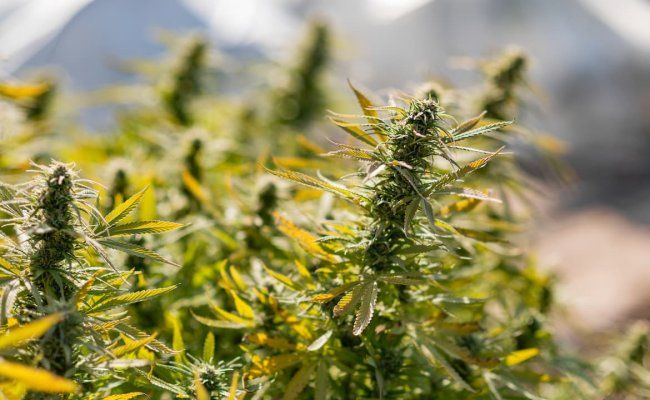Oregon, a haven for cannabis cultivation, is grappling with the consequences of unethical growers endangering the land and migrant workers. Renowned as the "Bordeaux of marijuana," the state is confronting a surge in illicit growers who carelessly exploit the land and its resources.
These negligent cultivators are causing environmental damage by depleting the water table, polluting the surroundings, and leaving trash everywhere. To address this issue, the Oregon Legislature is considering a bill that would hold landowners directly accountable for such malpractices.
The proposed legislation aims to prevent the misuse of groundwater and rivers, and it would allow authorities to seize the documents of migrant workers involved in the cultivation process, leading to potential deportation. Additionally, if landowners fail to cover cleanup costs, the government could file a lien against the property used for illicit cannabis cultivation.
Despite opposition from some Republicans, the bill has passed both the Senate and House. Oregon's Democratic Governor Tina Kotek is expected to sign it into law next week. Kotek's spokesperson, Elisabeth Shepard, stated that the governor supports cracking down on illegal cannabis operations, particularly in southern Oregon.
The allure of fast cash has led some landowners to lease or sell their property to dubious buyers, who often pay upfront with large sums of money. However, Democratic Sen. Jeff Golden argued that property owners should be wary of such lucrative offers.
Oregon's lush landscape has attracted a diverse range of foreign criminals, from Russia to Mexico, seeking to benefit from the American cannabis market. The influx of these illegal operations has strained local authorities, who lack the resources to shut down the numerous makeshift greenhouses. Workers on these illicit farms often endure deplorable living conditions and unfair wage deductions.
Jackson County Sheriff Nathan Sickler emphasized the issue of growers leaving waste behind, tarnishing the community's image and leaving it without the means to address the problem. By holding landowners accountable, Oregon hopes to combat the negative impact of these unscrupulous cannabis growers on both the environment and its migrant workforce.
While the bill has left some landowners feeling anxious, others see it as a positive change, according to AP. Many landowners were aware that their actions were wrong, and this legislation could help curb the issue, said Jack Dwyer, a homeowner near Selm, Oregon. In 2021, Dwyer reported that an illicit grow operation nearby drained all the water from a creek running through his property, leaving it bone dry.
Christopher Hall, who works to promote water stewardship among the public, also believes that the bill will effectively tackle the problem. Hall points out that these illegal grow farms purchased with cash not only transform streams into gravel roads but also contribute to severe human rights violations and the dumping of garbage, sewage, chemicals, and other waste into ditches, riparian zones, and streams.
These negligent cultivators are causing environmental damage by depleting the water table, polluting the surroundings, and leaving trash everywhere. To address this issue, the Oregon Legislature is considering a bill that would hold landowners directly accountable for such malpractices.
The proposed legislation aims to prevent the misuse of groundwater and rivers, and it would allow authorities to seize the documents of migrant workers involved in the cultivation process, leading to potential deportation. Additionally, if landowners fail to cover cleanup costs, the government could file a lien against the property used for illicit cannabis cultivation.
Despite opposition from some Republicans, the bill has passed both the Senate and House. Oregon's Democratic Governor Tina Kotek is expected to sign it into law next week. Kotek's spokesperson, Elisabeth Shepard, stated that the governor supports cracking down on illegal cannabis operations, particularly in southern Oregon.
The allure of fast cash has led some landowners to lease or sell their property to dubious buyers, who often pay upfront with large sums of money. However, Democratic Sen. Jeff Golden argued that property owners should be wary of such lucrative offers.
Oregon's lush landscape has attracted a diverse range of foreign criminals, from Russia to Mexico, seeking to benefit from the American cannabis market. The influx of these illegal operations has strained local authorities, who lack the resources to shut down the numerous makeshift greenhouses. Workers on these illicit farms often endure deplorable living conditions and unfair wage deductions.
Jackson County Sheriff Nathan Sickler emphasized the issue of growers leaving waste behind, tarnishing the community's image and leaving it without the means to address the problem. By holding landowners accountable, Oregon hopes to combat the negative impact of these unscrupulous cannabis growers on both the environment and its migrant workforce.
While the bill has left some landowners feeling anxious, others see it as a positive change, according to AP. Many landowners were aware that their actions were wrong, and this legislation could help curb the issue, said Jack Dwyer, a homeowner near Selm, Oregon. In 2021, Dwyer reported that an illicit grow operation nearby drained all the water from a creek running through his property, leaving it bone dry.
Christopher Hall, who works to promote water stewardship among the public, also believes that the bill will effectively tackle the problem. Hall points out that these illegal grow farms purchased with cash not only transform streams into gravel roads but also contribute to severe human rights violations and the dumping of garbage, sewage, chemicals, and other waste into ditches, riparian zones, and streams.




